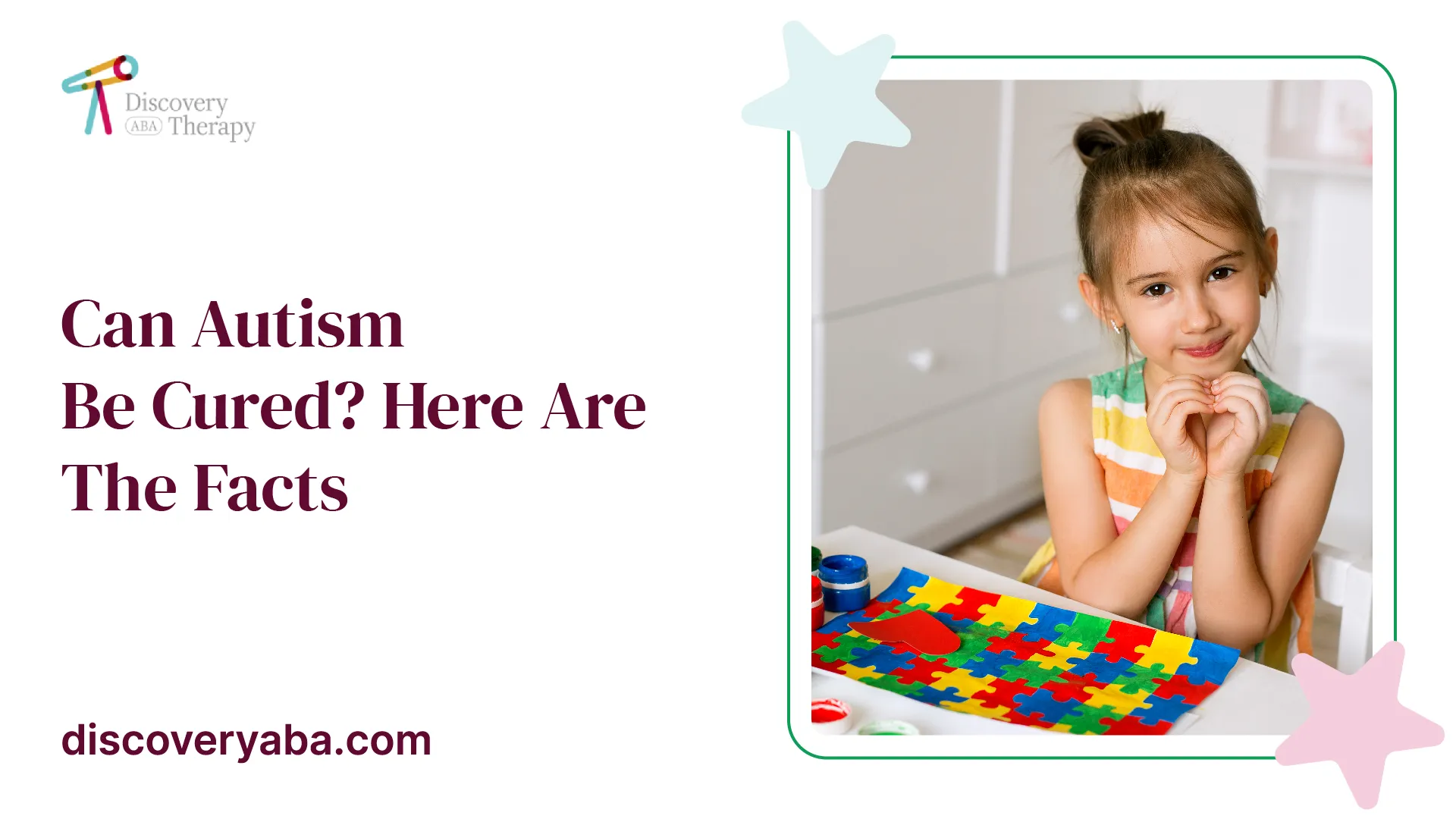Can Autism Be Cured? Here Are The Facts
Millions of people are wondering, can autism be cured? We'll answer this popular question in this guide.

Is there a cure for autism?
Autism is a developmental disorder that affects communication, social interaction, and behavior. It is a lifelong condition that affects people in different ways. While there is no cure for autism, there are several treatments and therapies that can help manage the symptoms.

One of the most promising treatments for autism is Applied Behavior Analysis (ABA). ABA is a therapy that focuses on teaching new skills and behaviors while reducing problematic behaviors.
It is a data-driven approach that uses positive reinforcement to encourage desired behaviors. ABA has been shown to be effective in improving communication, social interaction, and behavior in children with autism.
Another treatment option is medication. There are several medications that can help manage some of the symptoms of autism, such as anxiety, depression, and hyperactivity.
However, medication is not a cure for autism and should only be used under the guidance of a healthcare professional.
In addition to ABA and medication, there are several other therapies that can help manage the symptoms of autism. Occupational therapy can help with sensory integration and motor skills, while speech therapy can help with communication.
Social skills groups can also be beneficial for children with autism to learn how to interact with others.
It is important to note that autism is a spectrum disorder, which means that it affects people in different ways and to different degrees. There is no one-size-fits-all treatment for autism, and what works for one person may not work for another.
In conclusion, while there is no cure for autism, there are several treatments and therapies that can help manage the symptoms.
ABA, medication, occupational therapy, speech therapy, and social skills groups are just a few examples of the many treatment options available. It is important to work with a healthcare professional to develop a personalized treatment plan that meets the individual needs of each person with autism.
Types Of Treatment For Autism
There are many types of treatments available for autism, and what works for one person may not work for another. Some of the most common treatment options include behavioral therapy, occupational therapy, speech therapy, and medication.
Behavioral therapy is a popular treatment option that focuses on teaching new skills while reducing problematic behaviors.
Applied Behavior Analysis (ABA) is a type of behavioral therapy that uses positive reinforcement to encourage desired behaviors.
It has been shown to be effective in improving communication, social interaction, and behavior in children with autism.
Occupational therapy can also be beneficial for individuals with autism. This type of therapy focuses on developing fine motor skills, sensory integration, and daily living skills.
Occupational therapists work with individuals to develop personalized treatment plans that address their specific needs and challenges.
Speech therapy is another common treatment option for individuals with autism. Communication can be a challenge for people with autism, so speech therapists work on developing language skills and helping individuals communicate effectively.
Finally, medication can also be used to manage some of the symptoms associated with autism. Medications such as antidepressants or antipsychotics are sometimes prescribed to help manage anxiety or depression associated with the disorder.
It's important to note that these treatments are not cures for autism. Rather, they can help manage the symptoms associated with the disorder and improve an individual's quality of life. A healthcare professional should always be consulted when considering any type of treatment plan for a person with autism.
Fake and Harmful Treatments for Autism
Unfortunately, there are many fake or harmful treatments for autism that have been promoted over the years. These treatments not only fail to improve the symptoms of autism but can also cause harm to individuals with the disorder.
One such treatment is chelation therapy, which involves the use of chemicals to remove heavy metals from the body. This treatment has been promoted as a cure for autism, despite having no scientific evidence to support its effectiveness.
In fact, chelation therapy can be extremely dangerous and has resulted in serious harm and even death in some cases.
Another harmful treatment for autism is hyperbaric oxygen therapy (HBOT). This treatment involves breathing pure oxygen in a pressurized chamber, with the belief that it can reduce inflammation and improve brain function.
However, there is no scientific evidence to support this claim, and HBOT can actually be dangerous if not properly administered.
Other fake or harmful treatments for autism include restrictive diets, unproven supplements or vitamins, and unregulated stem cell therapies.
It's important to note that these treatments not only waste time and money but also divert attention away from effective treatments that can truly help individuals with autism.
It's crucial that individuals with autism receive appropriate care from qualified healthcare professionals who are knowledgeable about evidence-based treatments.
Families should be cautious when considering any new treatment and should always seek advice from their healthcare provider before trying any new intervention.
Future Directions in Autism Research
While there is no cure for autism, ongoing research is being conducted to better understand the disorder and develop new treatments and interventions. Here are some potential areas of future research:
Early Intervention
Research has shown that early intervention can greatly improve outcomes for children with autism. Therefore, one area of future research could focus on identifying effective interventions for very young children with autism.
This could include developing new screening tools to identify children at risk of autism as early as possible and implementing interventions that are tailored to their specific needs.
Genetics
There is strong evidence that genetics plays a role in the development of autism. Therefore, future research could focus on identifying specific genes or genetic mutations that contribute to the disorder.
This could lead to a better understanding of the underlying mechanisms of autism and potentially open up new avenues for treatment.
Brain Imaging
Advances in brain imaging technology have allowed researchers to better understand how the brains of individuals with autism differ from those without the disorder.
Future research could focus on using brain imaging techniques such as functional magnetic resonance imaging (fMRI) or positron emission tomography (PET) to further explore these differences and identify potential targets for treatment.
Personalized Medicine
Autism is a spectrum disorder, which means that it affects individuals differently. Therefore, one area of future research could focus on developing personalized treatments that are tailored to an individual's specific symptoms and needs.
This could involve using biomarkers or other measures to identify subtypes of autism and developing targeted interventions for each subtype.
New Therapies
In addition to existing therapies such as ABA and occupational therapy, future research could focus on developing new therapies or interventions for individuals with autism. For example, researchers are currently exploring the use of virtual reality therapy as a way to help individuals with social communication difficulties.
Overall, ongoing research holds promise for improving our understanding of autism and developing new treatments and interventions that can help individuals with the disorder lead fulfilling lives.
Does Your Child Have An Autism Diagnosis?
Learn More About How ABA Therapy Can Help
Find More Articles
Contact us
North Carolina, Nevada, Utah, Virginia
New Hampshire, Maine
Arizona, Colorado, Georgia, New Mexico, Oklahoma, Texas
.avif)




































































































